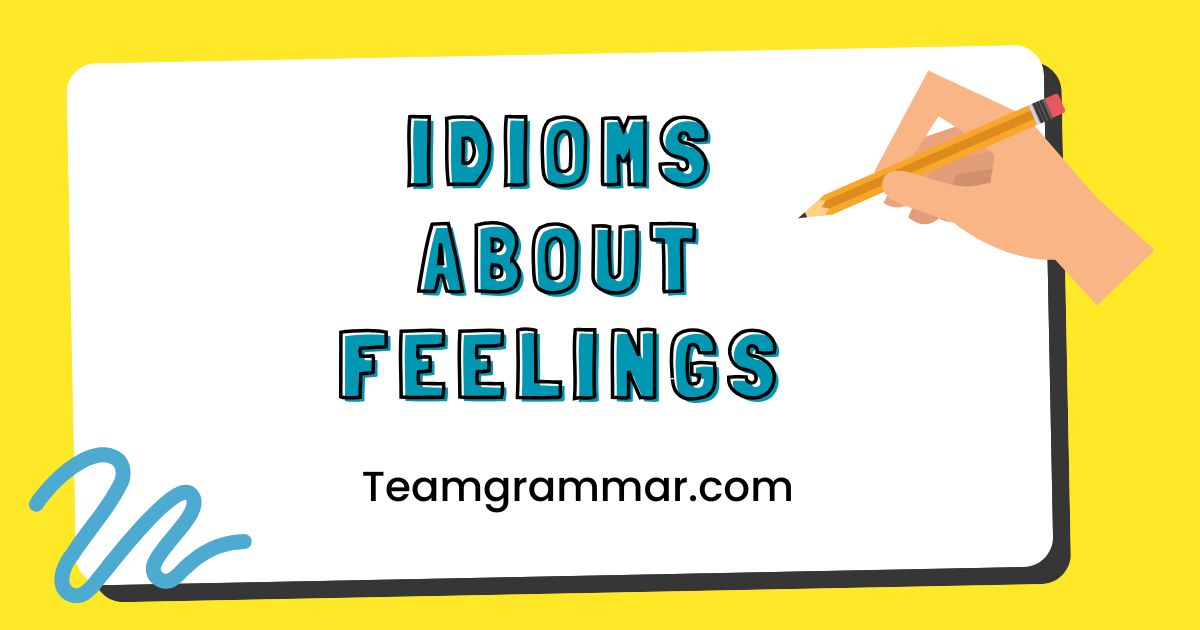25 Idioms About Feelings: Mastering Emotional English
Understanding idioms is crucial for mastering the nuances of English. Idioms about feelings, in particular, add color and depth to our communication, allowing us to express complex emotions in a vivid and relatable way.
This article explores the world of idioms related to feelings, providing definitions, examples, usage rules, and practice exercises. Whether you’re an English language learner or a native speaker looking to refine your vocabulary, this guide will help you navigate the emotional landscape of the English language with confidence.
Table of Contents
- Introduction
- Definition of Idioms About Feelings
- Structural Breakdown
- Types and Categories of Idioms About Feelings
- Examples of Idioms About Feelings
- Usage Rules for Idioms About Feelings
- Common Mistakes When Using Idioms About Feelings
- Practice Exercises
- Advanced Topics in Idioms About Feelings
- Frequently Asked Questions
- Conclusion
Definition of Idioms About Feelings
An idiom is a phrase or expression whose meaning cannot be understood from the literal meanings of its individual words. Instead, an idiom has a figurative meaning that is known through common usage.
Idioms about feelings are a subset of idioms that specifically describe emotional states or reactions. These idioms add color and depth to communication, allowing speakers to express complex emotions concisely and effectively.
They provide a more vivid and relatable way to describe feelings than literal language often can.
The function of idioms about feelings is to convey emotional states in a nuanced and culturally relevant way. They often rely on metaphors, similes, and cultural references to create a shared understanding between speakers.
The contexts in which idioms about feelings are used vary widely, ranging from casual conversations to formal writing. Understanding these contexts is crucial to using idioms appropriately and effectively.
Structural Breakdown
Idioms about feelings, like other idioms, do not adhere to strict grammatical rules in terms of their literal interpretation. Their structure is often fixed, meaning the words and their order cannot be changed without altering or losing the idiom’s meaning.
However, they often incorporate common grammatical structures, such as verb phrases, noun phrases, and prepositional phrases. For example, the idiom “to have a chip on one’s shoulder” uses a prepositional phrase to convey a feeling of resentment or bitterness.
The structural elements of idioms about feelings can be analyzed in terms of their individual words, but the overall meaning emerges from the phrase as a whole. The patterns within these idioms often involve metaphorical language, where one concept is used to represent another.
For example, “feeling blue” uses the color blue to represent sadness. Understanding these underlying structures and patterns can help learners recognize and use idioms more effectively.
Types and Categories of Idioms About Feelings
Idioms about feelings can be categorized based on the specific emotions they describe. Here are some common categories:
Idioms About Happiness
These idioms express joy, contentment, or general well-being.
Idioms About Sadness
These idioms convey sorrow, grief, or unhappiness.
Idioms About Anger
These idioms describe feelings of rage, frustration, or annoyance.
Idioms About Fear
These idioms express feelings of anxiety, apprehension, or terror.
Idioms About Surprise
These idioms convey astonishment, amazement, or shock.
Idioms About Anxiety
These idioms describe feelings of unease, worry, or nervousness.
Idioms About Love
These idioms express affection, adoration, or fondness.
Examples of Idioms About Feelings
The following tables provide examples of idioms about feelings, categorized by emotion. Each table includes the idiom, its meaning, and an example sentence to illustrate its usage.
The table below showcases idioms related to happiness, which are frequently used to express joy, contentment, and overall positive emotional states. Understanding these idioms can significantly enhance your ability to convey happiness effectively in English.
| Idiom | Meaning | Example Sentence |
|---|---|---|
| On cloud nine | Extremely happy | After getting the promotion, she was on cloud nine. |
| Over the moon | Extremely pleased | They were over the moon when they found out they were expecting a baby. |
| In seventh heaven | Completely happy | He’s been in seventh heaven since he started dating her. |
| Happy as a clam | Very content | He’s as happy as a clam now that he’s retired. |
| Walking on air | Feeling elated | She was walking on air after receiving the good news. |
| Full of the joys of spring | Cheerful and energetic | Despite the early hour, she was full of the joys of spring. |
| Grinning from ear to ear | Smiling widely | He was grinning from ear to ear when he opened his birthday presents. |
| Tickled pink | Very pleased | She was tickled pink to receive such a thoughtful gift. |
| Life is a bowl of cherries | Life is easy and pleasant | For him, life is a bowl of cherries since he won the lottery. |
| Paint the town red | Go out and celebrate | Let’s paint the town red to celebrate your graduation! |
| Have a whale of a time | Enjoy oneself greatly | We had a whale of a time at the amusement park. |
| Be on top of the world | Feeling wonderful | She was on top of the world after finishing the marathon. |
| Like a dog with two tails | Extremely happy and excited | He was like a dog with two tails when he got a new bike. |
| Got out of the right side of the bed | Be in a good mood | He must have got out of the right side of the bed this morning. |
| Brighten someone’s day | Make someone happy | Your kind words really brightened my day. |
| A ray of sunshine | A source of happiness | Her smile is like a ray of sunshine on a cloudy day. |
| In good spirits | Cheerful and happy | Despite the challenges, she remained in good spirits. |
| Singing someone’s praises | Express admiration or happiness | Everyone is singing her praises for her outstanding performance. |
| Butterflies in one’s stomach | Feeling nervous or excited | She had butterflies in her stomach before her presentation. |
| Be in high spirits | Happy, energized | The team was in high spirits after their victory. |
| A laugh a minute | Very funny and enjoyable | The comedian’s show was a laugh a minute. |
| Jump for joy | Show great happiness | She jumped for joy when she heard the news. |
| Eyes light up | Show great happiness | His eyes lit up when he saw the surprise party. |
| Beaming with pride | Looking very proud and happy | The parents were beaming with pride at their daughter’s graduation. |
| A dream come true | A long-awaited wish fulfilled | Winning the scholarship was a dream come true for him. |
The following table focuses on idioms that describe sadness. These expressions are used to convey feelings of sorrow, grief, and general unhappiness.
Mastering these idioms allows for a more nuanced and empathetic expression of sadness in your communication.
| Idiom | Meaning | Example Sentence |
|---|---|---|
| Feeling blue | Feeling sad or depressed | She’s been feeling blue since her cat died. |
| Down in the dumps | Feeling sad and without energy | He’s been down in the dumps since he lost his job. |
| Have a long face | Look sad | She had a long face after failing the exam. |
| A heavy heart | Feeling sad and burdened | He left with a heavy heart after saying goodbye to his family. |
| Tears welling up | About to cry | Tears were welling up in her eyes as she watched the movie. |
| Cry one’s eyes out | Cry a lot | She cried her eyes out when she heard the news. |
| A lump in one’s throat | Feeling emotional and unable to speak | She had a lump in her throat as she gave her speech. |
| Inconsolable | Unable to be comforted | He was inconsolable after the loss of his best friend. |
| At the end of one’s rope | Feeling overwhelmed and hopeless | She’s at the end of her rope with all the stress at work. |
| Hit rock bottom | Reach the lowest point in one’s life | He hit rock bottom when he lost his house and his job. |
| Bury one’s head in the sand | Ignore a problem | He’s burying his head in the sand about his financial problems. |
| A cloud hanging over one’s head | Feeling depressed or worried | There’s been a cloud hanging over her head since the argument. |
| Sing the blues | Express sadness or complain | He’s been singing the blues about his relationship problems. |
| Pour one’s heart out | Share one’s feelings openly | She poured her heart out to her best friend about her troubles. |
| Down in the mouth | Looking depressed | He’s been down in the mouth ever since he failed his driving test. |
| Wear one’s heart on one’s sleeve | Openly show one’s feelings | She wears her heart on her sleeve, so everyone knows how she feels. |
| Fed up to the back teeth | Extremely unhappy | I’m fed up to the back teeth with this constant rain. |
| Have a case of the Mondays | Feel sad or unmotivated on Mondays | She always has a case of the Mondays after a relaxing weekend. |
| A shadow of one’s former self | Not as happy or healthy as before | He’s been a shadow of his former self since his illness. |
| On the verge of tears | Almost crying | She was on the verge of tears when she spoke about her loss. |
| A load off one’s mind | Relief from worry | It was a load off her mind when she finally finished the project. |
| Shed tears | Cry | She shed tears during the emotional scene in the movie. |
| Wallowing in self-pity | Indulging in feelings of sadness | He needs to stop wallowing in self-pity and start moving forward. |
| Gloom and doom | Pessimistic outlook | He always predicts gloom and doom for the future. |
| Beaten down | Feeling defeated | She felt beaten down after getting rejected from the job. |
The following table presents idioms related to anger. These expressions are used to describe feelings of rage, frustration, and annoyance.
Comprehending these idioms will enable you to articulate anger and frustration more precisely in English.
| Idiom | Meaning | Example Sentence |
|---|---|---|
| See red | Become very angry | He saw red when he found out they had lied to him. |
| Blow a fuse | Lose one’s temper | She blew a fuse when the computer crashed. |
| Go ballistic | Become very angry and irrational | He went ballistic when he saw the damage to his car. |
| Hit the roof | Become extremely angry | My dad hit the roof when I crashed his car. |
| Fly off the handle | Lose one’s temper suddenly | He flies off the handle over the smallest things. |
| Foaming at the mouth | Extremely angry | He was foaming at the mouth when he found out about the betrayal. |
| Bite someone’s head off | Speak to someone angrily | She bit his head off when he asked a simple question. |
| Have a short fuse | Get angry easily | He has a short fuse, so be careful what you say. |
| Hot under the collar | Angry or agitated | He was getting hot under the collar during the argument. |
| Rage boils over | Anger becomes uncontrollable | His rage boiled over when he heard the insult. |
| In a black mood | Feeling angry and unhappy | He’s been in a black mood all day. |
| Livid | Extremely angry | She was livid when she found out about his mistake. |
| Mad as a hornet | Very angry | He was as mad as a hornet after the argument. |
| Get someone’s back up | Annoy someone | His comments got her back up. |
| Rub someone the wrong way | Irritate someone | He always rubs me the wrong way with his arrogance. |
| Up in arms | Angry and protesting | The community is up in arms about the new development. |
| Driven up the wall | Annoyed or frustrated | The constant noise is driving me up the wall. |
| Cross as two sticks | Very angry | She was as cross as two sticks when she found out. |
| Seeing stars | Feeling dizzy from anger | He was seeing stars after the heated exchange. |
| Make someone’s blood boil | Make someone extremely angry | His arrogance makes my blood boil. |
| Give someone a piece of one’s mind | Tell someone one’s angry thoughts | She gave him a piece of her mind after he lied. |
| Simmer down | Calm down | He needed to simmer down before he said something he’d regret. |
| Breathe fire | Express anger vehemently | The boss was breathing fire after the project failed. |
| Chew someone out | Scold someone severely | The coach chewed the team out after their poor performance. |
| With a vengeance | With intense anger | He pursued his goals with a vengeance after the setback. |
The table below presents idioms associated with fear. These idioms are utilized to articulate feelings of anxiety, apprehension, or terror.
By learning these expressions, you can more effectively and precisely convey fear and anxiety in English.
| Idiom | Meaning | Example Sentence |
|---|---|---|
| Have butterflies in one’s stomach | Feel nervous | She had butterflies in her stomach before the presentation. |
| Cold feet | Become nervous before an event | He got cold feet and cancelled the wedding. |
| Scared stiff | Very frightened | She was scared stiff when she heard the noise. |
| Shake like a leaf | Tremble with fear | He was shaking like a leaf during the storm. |
| Jump out of one’s skin | Be very startled | She jumped out of her skin when the door slammed shut. |
| Goosebumps | Small bumps on the skin from fear or cold | I got goosebumps when I heard the ghost story. |
| Hair stand on end | Become frightened | The scary movie made my hair stand on end. |
| Afraid of one’s own shadow | Very timid | He’s so afraid of his own shadow. |
| Frozen with fear | Unable to move because of fear | She was frozen with fear when she saw the snake. |
| Heart in one’s mouth | Feeling extreme fear | My heart was in my mouth during the roller coaster ride. |
| Petrified | Extremely frightened | She was petrified of public speaking. |
| White as a sheet | Looking very pale from fear | He turned as white as a sheet when he heard the news. |
| Have a close call | Narrowly avoid danger | We had a close call when the car almost hit us. |
| On edge | Anxious or nervous | She’s been on edge all day waiting for the results. |
| Sweating bullets | Very nervous and anxious | He was sweating bullets before the exam. |
| A nervous wreck | Extremely nervous | She was a nervous wreck before her interview. |
| Keep someone on tenterhooks | Keep someone in suspense | The cliffhanger kept us on tenterhooks until the next episode. |
| In a cold sweat | Sweating from fear | He woke up in a cold sweat after the nightmare. |
| Quaking in one’s boots | Trembling with fear | He was quaking in his boots before meeting the boss. |
| Send shivers down one’s spine | Frighten someone | The eerie music sent shivers down my spine. |
| Scream bloody murder | Scream loudly in fear | She screamed bloody murder when she saw the spider. |
| Take fright | Become suddenly frightened | The horse took fright and bolted. |
| The jitters | Feeling nervous | He had the jitters before his performance. |
| Butterflies in the stomach | Feeling nervous or excited | She always gets butterflies in her stomach before a big event. |
| Be scared out of one’s wits | Extremely scared | The sudden noise scared me out of my wits. |
Usage Rules for Idioms About Feelings
When using idioms about feelings, it is essential to consider the context and audience. Idioms are often informal and may not be appropriate for formal writing or professional settings.
Additionally, idioms can be culturally specific, so it’s important to ensure that the audience will understand the intended meaning. Using an idiom incorrectly can lead to confusion or miscommunication.
The tense and grammatical structure of idioms about feelings should be maintained. While some idioms allow for slight variations, changing the words or word order can alter the meaning or render the idiom incomprehensible.
For example, saying “I am feeling a blue” instead of “I am feeling blue” is grammatically incorrect and does not convey the intended meaning.
Pay attention to the connotations of the idiom. Some idioms about feelings may have negative or sarcastic connotations, while others are more neutral or positive.
Choose idioms that accurately reflect the intended emotional tone. For example, using “happy as a clam” to describe someone who is only mildly content might be an exaggeration.
Common Mistakes When Using Idioms About Feelings
One common mistake is taking idioms literally. Idioms have figurative meanings, so interpreting them literally can lead to misunderstandings.
For example, if someone says they are “feeling blue,” it does not mean they are literally the color blue; it means they are feeling sad.
Another mistake is using idioms incorrectly or out of context. Using an idiom in an inappropriate situation can sound awkward or confusing.
For example, using the idiom “paint the town red” in a somber or serious context would be inappropriate.
Misunderstanding the cultural context of idioms is also a common error. Some idioms are specific to certain cultures or regions, and using them with an audience that is not familiar with them can lead to confusion.
For example, an idiom common in British English might not be understood by an American audience, and vice versa.
Here are some examples of common mistakes:
| Incorrect | Correct | Explanation |
|---|---|---|
| I am feeling a blue. | I am feeling blue. | The article ‘a’ is not needed before ‘blue’ in this idiom. |
| He was on cloud ten. | He was on cloud nine. | The correct idiom is “on cloud nine,” not “on cloud ten.” |
| She is down in a dump. | She is down in the dumps. | The correct idiom is “down in the dumps,” not “down in a dump.” |
| He saw greens. | He saw red. | The idiom to express anger is “see red,” not “see greens.” |
| She had cold foots. | She had cold feet. | The correct idiom is “cold feet,” not “cold foots.” |
Practice Exercises
Test your understanding of idioms about feelings with the following exercises. Choose the correct idiom to complete each sentence.
| Question | Options | Answer |
|---|---|---|
| After winning the lottery, she was __________. | a) feeling blue, b) on cloud nine, c) seeing red | b) on cloud nine |
| He’s been __________ since he lost his job. | a) over the moon, b) down in the dumps, c) full of beans | b) down in the dumps |
| When he found out they had lied to him, he __________. | a) felt blue, b) saw red, c) walked on air | b) saw red |
| She had __________ before her presentation. | a) cold feet, b) a heavy heart, c) a long face | a) cold feet |
| The scary movie made my __________. | a) heart sing, b) hair stand on end, c) blood boil | b) hair stand on end |
| He’s __________ with all the stress at work. | a) at the end of his rope, b) on top of the world, c) in seventh heaven | a) at the end of his rope |
| She __________ when she heard the news. | a) cried her eyes out, b) painted the town red, c) had a whale of a time | a) cried her eyes out |
| He was __________ when he got a new bike. | a) like a dog with two tails, b) feeling blue, c) hot under the collar | a) like a dog with two tails |
| Your kind words really __________ my day. | a) blew a fuse, b) brightened, c) sent shivers down my spine | b) brightened |
| The community is __________ about the new development. | a) up in arms, b) on cloud nine, c) full of the joys of spring | a) up in arms |
Exercise 2: Fill in the blanks with the appropriate idiom.
| Question | Answer |
|---|---|
| She was __________ to receive such a thoughtful gift. | tickled pink |
| He’s been __________ since he started dating her. | in seventh heaven |
| The constant noise is __________ me __________. | driving, up the wall |
| He was __________ before the exam. | sweating bullets |
| The eerie music __________ my __________. | sent shivers down, spine |
| He needed to __________ before he said something he’d regret. | simmer down |
| The coach __________ the team __________ after their poor performance. | chewed, out |
| He pursued his goals __________ after the setback. | with a vengeance |
| She always gets __________ in her stomach before a big event. | butterflies |
| The sudden noise __________ me __________. | scared, out of my wits |
Advanced Topics in Idioms About Feelings
For advanced learners, exploring the origins and etymology of idioms about feelings can provide a deeper understanding of their meanings and cultural significance. Many idioms have historical roots or are derived from literature, mythology, or folklore.
Understanding these origins can enhance comprehension and appreciation of the nuances of the English language.
Another advanced topic is the use of idioms in literature and rhetoric. Authors and speakers often use idioms about feelings to create vivid imagery, evoke emotions, and connect with their audience.
Analyzing how idioms are used in different contexts can improve one’s ability to interpret and use language effectively.
Finally, exploring regional variations in idioms about feelings can be a fascinating area of study. Different regions and dialects may have their own unique idioms for expressing emotions.
Learning about these variations can enhance cross-cultural communication and understanding.
Frequently Asked Questions
- What is the difference between an idiom and a literal expression?
An idiom is a phrase whose meaning cannot be understood from the literal meanings of its individual words. A literal expression, on the other hand, means exactly what it says.
- Why is it important to learn idioms about feelings?
Learning idioms about feelings helps you express emotions more vividly and understand others better. It also enhances your overall fluency and cultural understanding of the English language.
- Are idioms about feelings the same in all English-speaking countries?
No, idioms can vary by region and culture. Some idioms are common in one English-speaking country but not in others. It’s important to be aware of these variations to avoid confusion.
- How can I learn new idioms about feelings?
Read books, watch movies, listen to podcasts, and pay attention to how native speakers use language. Keep a notebook of new idioms you encounter and practice using them in your own conversations.
- Is it okay to use idioms in formal writing?
Generally, idioms are more appropriate for informal communication. In formal writing, it’s usually better to use more direct and literal language.
- What should I do if I don’t understand an idiom?
Ask for clarification. Don’t be afraid to ask the speaker to explain the meaning of the idiom. You can also look it up in a dictionary or online resource.
- How can I avoid misusing idioms about feelings?
Pay attention to the context, audience, and connotations of the idiom. Practice using new idioms in different situations to get a feel for how they are used correctly.
- Are there any resources that can help me learn more about idioms?
Yes, there are many online dictionaries, websites, and books dedicated to idioms. Some popular resources include the Oxford Dictionary of Idioms, the Cambridge Idioms Dictionary, and various online idiom dictionaries.
- How do I know if an idiom is appropriate for a certain situation?
Consider the formality of the situation, the relationship with your audience, and the potential for misunderstanding. If in doubt, it’s often best to use more direct and literal language.
- Can idioms about feelings have multiple meanings?
Yes, some idioms can have multiple meanings depending on the context. Pay attention to the surrounding words and phrases to determine the intended meaning.
- Is it better to use simpler language than an idiom if I’m unsure?
Yes, clarity is always the most important thing. If you’re unsure whether an idiom is appropriate or if your audience will understand it, it’s better to use simpler, more direct language.
- How does understanding idioms about feelings improve my English language skills?
Understanding idioms enhances your comprehension, vocabulary, and cultural awareness. It also makes your communication more nuanced and effective, allowing you to express emotions more accurately and connect with others on a deeper level.
Conclusion
Mastering idioms about feelings is an essential step in achieving fluency and cultural competence in English. These idioms add color and depth to communication, allowing speakers to express complex emotions in a vivid and relatable way.
By understanding the definitions, usage rules, and common mistakes associated with idioms about feelings, learners can enhance their ability to interpret and use language effectively.
Remember to pay attention to the context, audience, and connotations of idioms when using them. Practice using new idioms in different situations to get a feel for how they are used correctly.
With consistent effort and attention, you can expand your vocabulary and improve your overall communication skills. Keep exploring and practicing, and you’ll find yourself expressing your feelings with greater confidence and nuance in no time.







